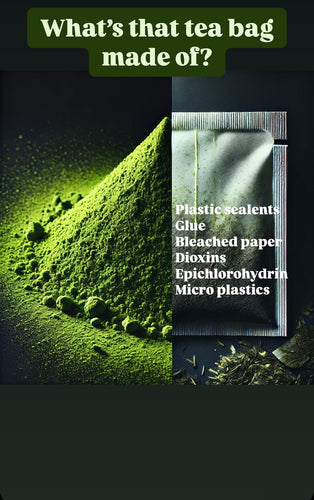Yesterday, while I was investigating the environmental impact of ‘to-go’ cups, it dawned on me to look into what’s actually in the materials used for tea bags. Boy, was that an eye-opener! Who knew that innocent little bag was hiding so many secrets? From adhesives to microplastics, conventional tea bags can contain materials that affect both our health and the planet.
The Hidden Ingredients in Tea Bags
For years, tea bags have been the go-to option for convenience, but let’s look closely at what goes into creating that little sachet.
-
Plastic Sealants and Glues
Most tea bags are sealed with plastic or glue to prevent the leaves from spilling out during steeping. Common materials include polypropylene—a type of plastic that, when exposed to hot water, can release tiny microplastics into your tea. These particles are invisible but end up in your drink, entering your body over time. -
Bleached Paper and Dioxins
Many paper tea bags are whitened using chlorine or other bleaching processes. This can introduce trace amounts of dioxins into the tea. Dioxins are known to be harmful even in small amounts and can accumulate in the body over time. -
Epichlorohydrin: The Chemical That Keeps Bags Dry
Some tea bags contain epichlorohydrin, a chemical added to prevent the bag from breaking down when wet. While it helps maintain the structure, epichlorohydrin has been linked to potential health risks, including effects on the immune system. When exposed to hot water, it can hydrolyze into a carcinogen, adding an unwanted element to your tea. -
Microplastics
Tea bags made from nylon or other synthetic fibers are even more concerning, as they release a significant amount of microplastics into hot water. One study found that a single plastic-based tea bag could release billions of microplastic particles into a single cup of tea. These microplastics accumulate in our bodies over time and have been shown to impact our health, particularly the digestive and endocrine systems.
Whole Leaf Tea: Combining Tradition with Innovation
The alternative to conventional tea bags is whole leaf tea, which skips the additives and chemicals of processed bags. Here’s why whole leaf is not only purer but also healthier:
-
Enhanced Nutrient Absorption
With whole leaf tea, you’re getting the full flavor and nutritional benefits. Since the leaves aren’t cut or finely ground (as they are in bagged tea), they retain their essential oils, which are responsible for much of tea’s antioxidants and health-boosting compounds. The entire leaf, in a micro-ground form, allows you to consume its full spectrum of nutrients. It's no secret that micro ground tea is a SUPERFOOD so why toss that away?! -
Richer Flavor and Aroma
Whole leaf tea holds onto all the plant’s compounds, giving it a deeper, richer taste and more complex aromas. Since the leaves aren’t constrained by a bag, they can unfurl fully, releasing more flavor naturally. -
No Unwanted Additives
Whole leaf tea isn’t processed with plastic sealants, glue, or chemical stabilizers. When you brew it, you’re simply steeping pure tea leaves. With innovations like micro-ground teas, you can enjoy the benefits of the entire leaf without any additives or preservatives. -
Environmentally Friendly
Whole leaf tea avoids the single-use waste of tea bags, and when it’s micro-ground or loose, it eliminates the plastic, glue, and bleached paper that are so common in traditional tea bags. This makes it a cleaner, more sustainable option that aligns with eco-conscious living.
Bringing the Best of Both Worlds with Domo
At Domo, we believe in combining the wisdom of traditional whole leaf tea with modern convenience. Our blends use micro-ground whole leaves, meaning you consume the entire leaf and all of its natural benefits in a single serving. This innovative approach lets you skip the chemicals and microplastics, giving you a purer, more flavorful tea experience that’s just as convenient.
In a world where we’re surrounded by synthetic materials, choosing a cleaner, more natural option like whole leaf tea is one way to look after our bodies and our planet. So, next time you reach for a cup of tea, consider what you’re drinking—and choose tea that’s made to support your health, not compromise it.

